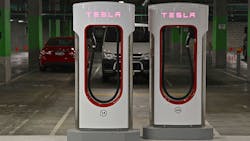Tesla Unveils Pricing Structure for Supercharging Stations
Tesla Motors Inc. (IW 500/227) said it will charge new customers fees to use its Supercharging stations if they exceed an annual limit, detailing its price structure to help pay for the expansion of its network of stations.
The move announced Thursday marks Tesla’s first attempt to monetize a service that the company’s electric-car owners have long enjoyed for free as it prepares to introduce the more affordable Model 3 sedan later this year. The company led by Elon Musk stressed that Tesla is “only aiming to recover a portion of our costs and set up a fair system for everyone; this will never be a profit center for Tesla.”
Tesla vehicles ordered after Jan. 15, 2017, will receive roughly 400 kilowatt-hour of free Supercharging credits (about 1,000 miles) annually on the anniversary of their delivery.
“If customers travel beyond their annual credit, they will be charged a small fee to Supercharge,” Tesla said in a blog post Thursday. “In North America, pricing is fixed within each state or province; overseas, pricing is fixed within each country.”
Tesla said the Supercharging fee, for example, would be about $15 for a road trip from San Francisco to Los Angeles, about $120 for a cross-country trip from Los Angeles to New York, about 60 euros from Paris to Rome and about 400 yuan from Beijing to Shanghai.
Tesla’s Supercharging stations, typically located at malls on highways between major cities, aim to ease car owners’ anxiety about running out of power and enable long-distance road trips in Tesla’s vehicles. The company has 795 Supercharging stations globally. Each station typically has six to eight spots for cars to park and charge. Superchargers currently deliver roughly 170 miles of range in 30 minutes.
The company in November announced the end of free Supercharging. On Thursday, it provided details of the pricing structure for the service.
Where possible, owners will be billed per kWh (kilowatt-hour), which will vary in the U.S. from state to state. In California, for example, the fee is 20 cents; in West Virginia, it’s 11 cents. Unused credits do not roll over to the next year; credits are reset to 400 kWh each year, on the anniversary of the delivery date. If the car transfers ownership, credits are reset on the date of the transfer.
By Dana Hull
About the Author
Bloomberg
Licensed content from Bloomberg, copyright 2016.
